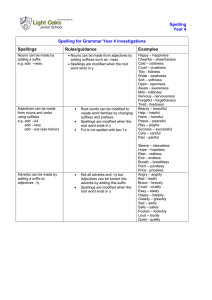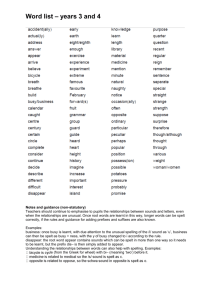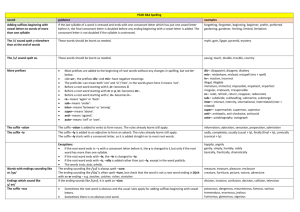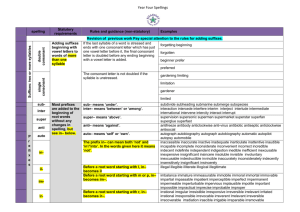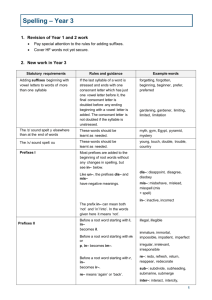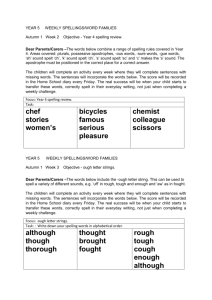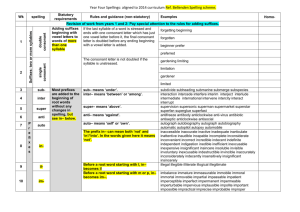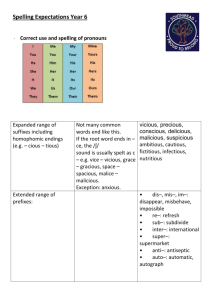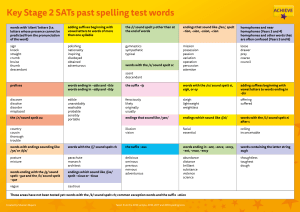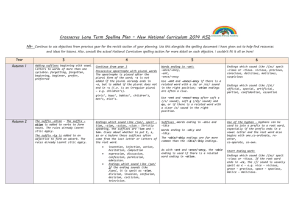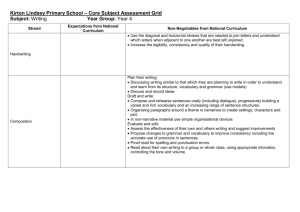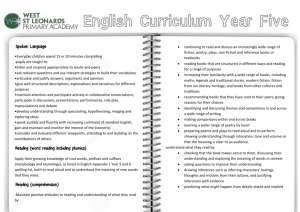Spelling - Parklands Primary School
advertisement
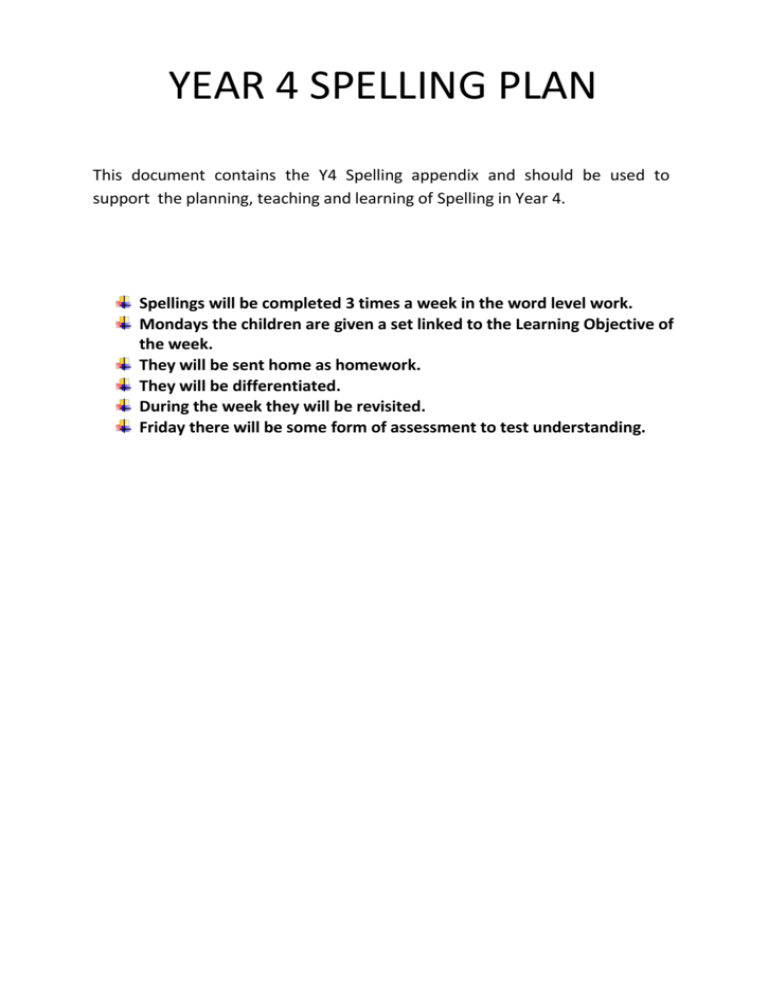
YEAR 4 SPELLING PLAN This document contains the Y4 Spelling appendix and should be used to support the planning, teaching and learning of Spelling in Year 4. Spellings will be completed 3 times a week in the word level work. Mondays the children are given a set linked to the Learning Objective of the week. They will be sent home as homework. They will be differentiated. During the week they will be revisited. Friday there will be some form of assessment to test understanding. National Curriculum 2014 Planning Document Y4 Spelling Appendix Revision of work from Year 1, 2 and 3 Statutory Guidance Non- Statutory Guidance Examples Adding suffixes beginning with vowel letters to words of more than one syllable If the last syllable of a word is stressed and ends with one consonant letter which has just one vowel letter before it, the final consonant letter is doubled before any ending beginning with a vowel letter is added. The consonant letter is not doubled if the syllable is unstressed. forgetting, forgotten, beginning, beginner, prefer, preferred gardening, gardener, limiting, limited, limitation The /ʌ/ sound spelt ou These words should be learnt as needed. The suffix –ation The suffix –ation is added to verbs to form nouns. information, The rules already learnt still apply. preparation, admiration Words with endings sounding like /ʒə/ or/tʃə/ The suffix –ous Endings which sound like /ʃən/, spelt –tion, –sion, –ssion, –cian The ending sounding like /ʒə/ is always spelt –sure. The ending sounding like /tʃə/ is often spelt –ture, but check that the word is not a root word ending in (t)ch with an er ending – e.g. teacher, catcher, richer, stretcher. Sometimes the root word is obvious and the usual rules apply for adding suffixes beginning with vowel letters. Sometimes there is no obvious root word. –our is changed to –or before –ous is added. A final ‘e’ of the root word must be kept if the /dʒ/ sound of ‘g’ is to be kept. If there is an /i:/ sound before the –ous ending, it is usually spelt as i, but a few words have e. Strictly speaking, the suffixes are –ion and – ian. Clues about whether to put t, s, ss or c before these suffixes often come from the last letter or letters of the root word. –tion is the most common spelling. It is used if the root word ends in t or te. –ssion is used if the root word ends in ss or –mit. young, touch, double, trouble, country adoration, sensation, measure, treasure, pleasure, enclosure creature, furniture, picture, nature, adventure poisonous, dangerous, mountainous, famous, various tremendous, enormous, jealous humorous, glamorous, vigorous courageous, outrageous serious, obvious, curious hideous, spontaneous, courteous invention, injection, action, hesitation, completion expression, discussion, confession, permission, admission –sion is used if the root word ends in d or se. Exceptions: attend – attention, intend – intention. expansion, extension, comprehension, tension –cian is used if the root word ends in c or cs. musician, electrician, magician, politician, mathematician league, tongue, antique, unique Words ending with the /g/ sound spelt –gue and the /k/ sound spelt –que (French in origin) Words with the /s/ sound spelt sc (Latin in origin) Words with the /eɪ/ sound spelt ei, eigh, or ey Possessive apostrophe with In the Latin words from which these words come, the Romans probably pronounced the c and the k as two sounds rather than one – /s/ /k/. science, scene, discipline, fascinate, crescent vein, weigh, eight, neighbour, they, obey The apostrophe is placed after the plural form girls’, boys’, babies’, children’s, men’s, of the word; –s is not added if the plural mice’s already ends in (Note: singular proper nouns ending in –s, but is added if the plural does not end in –s (i.e. is an irregular plural – e.g. children’s). an s use the ’s suffix e.g. Cyprus’s population) Address, answer, bicycle, calendar, caught, centre, century, certain, circle, decide, describe, eight, eighth, enough, exercise, experience, experiment, extreme, grammar, group, guard, guide, material, medicine, mention, natural, naughty, notice, often, opposite, ordinary, particular, peculiar, perhaps, popular, position, possession, possess, possible, potatoes, pressure, probably, promise, purpose, recent, reign, sentence, separate, special, various, weight.
